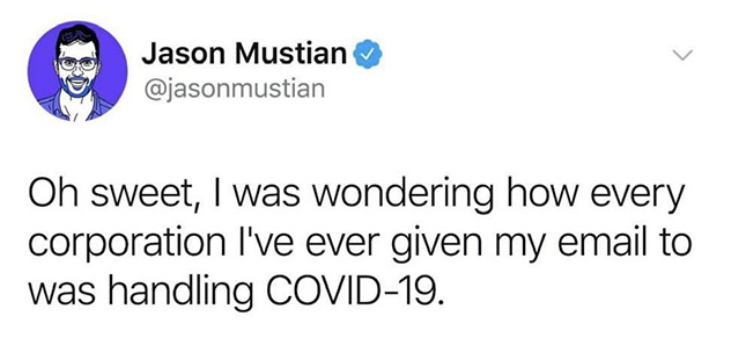3 Ways to Change Your Content & Social Marketing To Foster Digital Empathy
ORIGINALLY POSTED BY SOCIAL MEDIA WEEK.
From creating genuine resources and promoting authenticity, here’s how your social marketing can be more empathetic post-COVID-19.
These days, when we are no longer sure what tomorrow is going to bring and most of us are isolated from the rest of the world, we all feel extremely vulnerable and insecure.
This is the time when brands and businesses are uniting forces to spread love and help people cope with fear and isolation.
For example, Facebook has launched the care button helping its users empathize and sympathize with one another. Guinness issued a supportive commercial to emphasize the importance of social distancing and kindness instead of promoting its usual agenda.
If you have content to give away, now is the best time to do that. For example, instead of extending free trial offers like many companies did, Audible offered a huge part of its premium content free of charge, with no app or account needed to access it. To access the free content, people can simply use Audible’s player that requires no downloading or registration.
You don’t have to be a huge brand to be helpful. WP Beginner’s founder has put together a mega guide to help people losing jobs to find a way to build income online.
This is the kind of empathy brands need to be striving: No strings attached.
Now that humanity is facing a lot of uncertainty, business owners and marketers need to take a long-term view. While keeping your business afloat must still be our top priority, changing the focus from increasing revenue to fostering empathy is key to stability.
In this trying time, marketers need to find the way for their brands to communicate compassion, and not for the sake of increased revenue. Your brand image is what can help your business survive.
Not every brand can afford to be a caregiver but all of us should be doing our best at helping one another make it through these difficult times.
Newsjacking needs to give way to genuine empathy.
WHAT IS DIGITAL EMPATHY?
Emotional empathy is a human being’s capacity to feel the emotions of another.
Empathy helps create a better marketing strategy by pushing brands to imagine how their target customers may feel when hearing the marketing message or using the product in question.
Empathic marketing approach has also proven to build trust through genuine customer-centricity.
HOW CAN CONTENT MARKETING FOSTER DIGITAL EMPATHY?
CREATE A GENUINELY USEFUL RESOURCE
Creating an education resource has always been a somewhat selfish endeavor, at least when brands were investing in it. They were trying to get links back and/or traffic in exchange for investing in a purely informational content asset.
These days, investing in being helpful to the community is more than a marketing tactic. It is part of guiding your past and potential customers through these difficult times, making their lives easier. It’s giving back to the world.
To create a genuinely useful resource, use niche question research. Text Optimizer provides a helpful tool allowing you to uncover questions your target customers are looking to answer.
According to a report done by Edelman, the overwhelming majority of consumers – over 80% – want brands to use their voices to educate, so this is the best and the safest tactic you can embrace now.
Now that lots of people are actively looking for ways to use the time at home productively and educate themselves, the best you can do is to use your internal company’s expertise, tools and products to build something really helpful and practical. Here are the tools to put together a knowledge base or a wiki to get you started.
AVOID MAKING MISLEADING CLAIMS
Nowadays all businesses are trying to maintain or even increase sales by figuring out how their product line fits into the new reality. This approach may be dangerous as this strategy may result in insensitive and misleading claims.
For example, a bank informing customers how to use its tools to keep their finances safe is appreciated. However a drink manufacturer building content on how their product will keep you hydrated if you get sick is a plain PR stunt.
When you are planning your content strategy around current pandemic, always ask yourself important questions:
Is this content going to be genuinely helpful and useful?
Do I (or my writers) have a solid expertise in this new angle?
Is the tone going to be neutral?
Is this piece going to be scientifically supported?
Providing good references to trusted resources is always a good idea, especially if you mention any health-related tips.
Search Google for [keyword site:GOV] to find official and government-supported sources to include:
IF YOU HAVE NOTHING TO CONTRIBUTE, SAY NOTHING
The brands’ willingness to exploit COVID-19 pandemic has been so obvious, it has resulted in lots of hilarious memes.
When businesses are being criticized and lose credibility, the best thing you can do is to stay away. If you are not sure your message is helpful and genuine enough, just keep silent until you are sure.
This strategy will pay off: When finally your voice is needed, you will be heard.
It may be tempting to speak up now while it is still hot news, but brands are as vulnerable these days as are consumers. Take your time figuring how to refocus your content marketing strategy the way it is both safe to your brand message and helpful for the community.
Brands need to define a credible role they are playing, or step back and say nothing.
Include your co-workers in crafting your content marketing plan and evaluating it. They may provide you with some insight into how different people may react to your message and how to make it more helpful.
If collaboration hasn’t been part of your content marketing routine, now is a good time that you streamline and foster your in-company communication. Nextiva offers a solutions for improved internal business communication by consolidating all kinds of communication apps together.
The more efficiently information is shared throughout the company, the more thoughtful marketing strategy you will be able to set up.
THIS CRISIS IS NOT ABOUT YOU
Finally, this is not about you or your brand. This crisis is about everyone in the world.
Try making it about you and risk facing a serious reputational crisis. This is both McDonald and Volkswagen trying to hijack the “social distancing” approach by changing their own logos did get them into the news outlets but failed to impress anyone.
These days the risk of a long-term negative brand association is far greater than a quick wins.
Earn your customers’ trust now and they will stick around long after the crisis is over. According to the aforementioned report from Edelman, over 70% of consumers claim they will lose trust in a brand if their marketing message is putting profit over people.
It has long been a valid marketing tactic to pick up on the latest trends and adapt your marketing to tune into the interest peak. But in these months of stress and uncertainty, marketers need to be extra careful and avoid betting on the target customer’s vulnerability.
It is time that brands should urge authenticity and embrace digital empathy. Marketers need to use a thoughtful approach to PR and focus on authenticity and action.



